Iran’s Khamenei Appoints Infamous Figure As Police Chief
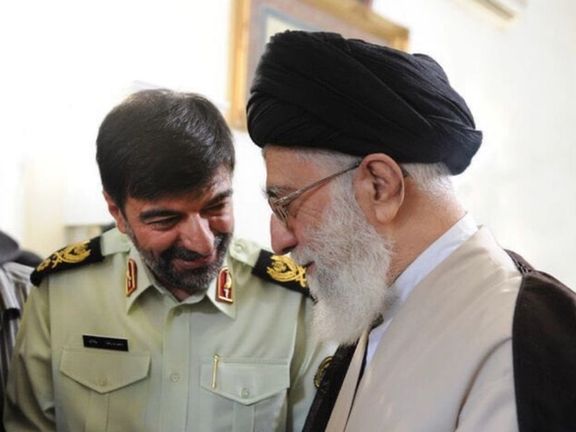
Iran's Supreme Leader Ali Khamenei has appointed an infamous military figure as the country's new police chief to step up crackdown on protests.

Iran's Supreme Leader Ali Khamenei has appointed an infamous military figure as the country's new police chief to step up crackdown on protests.
On Saturday, Khamenei appointed Ahmadreza Radan, an IRGC officer who was transferred to police forces many years ago, as the country's new Commander-in-chief of Law Enforcement Force replacing Hossein Ashtari.
Sources had earlier told Iran International that Khamenei had "harshly scolded" Ashtari over his "incompetence" in quelling anti-regime protests.
Radan served as a deputy police chief from 2008 to 2014 and played a key role in the crackdown on protesters after the disputed 2009 presidential elections and in the formation of “morality police”.
Radan was heading the Center for Strategic Studies of the Law Enforcement Force.
He has been designated by the United States as a person who is, "among other things, responsible for or complicit in, or responsible for ordering, controlling, or otherwise directing, the commission of serious human rights abuses against citizens of Iran or their family members."
In 2007, Ahmad-Reza Radan launched a "Public Security Plan". The police arrested dozens of alleged criminals for what it called “increasing public security”. The people were sometimes beaten on camera in front of city inhabitants.
In his Saturday decree, Khamenei urged Radan to ensure that people are satisfied with the police's performance in providing security, a rhetoric indicating security for the regime amid protests.
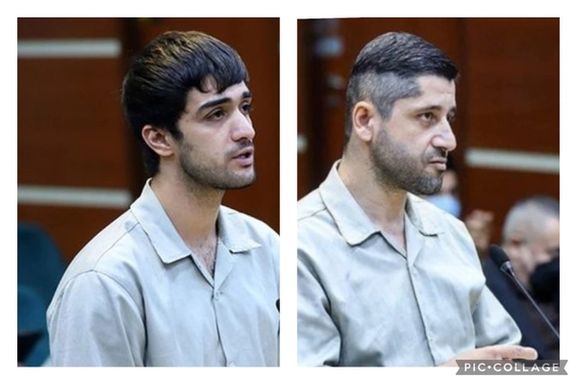
The clerical regime in Iran hanged two men on Saturday for allegedly killing a Basij agent during antigovernment protests near the capital Tehran in October.
"Mohammad Mehdi Karami and Seyyed Mohammad Hosseini, main perpetrators of the crime that led to the unjust martyrdom of Ruhollah Ajamian were hanged this morning," the judiciary said in a statement carried by the official IRNA news agency.
Karami was 22 years old, and Hosseini 39 were tried without having access to attorneys of their choosing, as almost all other dissidents and protesters arrested during the demonstrations. The circumstances related to the killing of Ajamian are not clear, as often the Basij paramilitary forces take the lead to attack protesters and use deadly force.
The convictions were not based on a criminal charge related to the murder per se, but they were charged with ‘moharebeh’, meaning “war against God”, a vague religious concept. The Islamic Republic applies the charge to people who might get into a confrontation with security forces during protests.
“I met with Seyed-Mohammad Hosseini at Karaj Prison. He cried through his account of tortures, being beaten with tied hands and legs and blindfolded, to being kicked in the head and losing consciousness, the soles of his feet being beaten with an iron rod to being tased in different parts of the body,” Ali Sharifzadeh Ardakani who says he has just recently been allowed to represent Hosseini tweeted on December 18.
Despite widespread international attempts to stop the executions, the regime decided to implement the verdict reached in November. Officials say death sentences for three others in the same case have been canceled.
So far, the government has executed four protesters and eleven others have received the death penalty, some for much less charges than murder, while at least 100 protesters face charges that could end in death sentences for them, an Iranian human rights group based in Oslo has reported.
The first two hangings triggered strong international condemnations and hundreds of lawmakers in Europe and Australia began sponsoring Iranian detainees in danger of execution to generate publicity and impact their fate.
French lawmaker Aude Luquet had taken on Hosseini’s political sponsorship and called for an immediate halt to all executions in Iran. Hosseini is also sponsored by Austrian parliamentarian Harold Truch.
Mohammad-Mehdi Karami was sponsored by Helge Limburg, member of the German parliament. “The regime in Iran assumes that he was involved in a killing. In truth he should die because he stands up for democracy and human rights. His execution would be a judicial killing,” Limburg tweeted December 12.
Activists had earlier called for protests in Iran and abroad on Sunday, January 8, the third anniversary of the downing of a Ukrainian airliner over Tehran by the Revolutionary Guard that killed all 176 people onboard. The executions on Saturday will add fuel to people's anger and big protests can take place as early as today.
Dozens of prisoners are either on hunger strike or suffer from life-threatening illnesses that are not treated by prison authorities and some are deprived of life-saving medications.
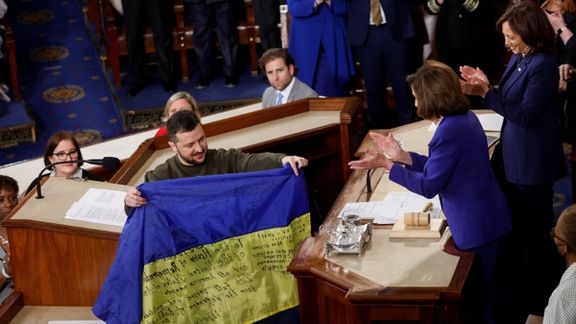
The United States Treasury Friday designated six executives or board members of an Iranian company it said were involved in supplying military drones to Russia.
Qods Aviation Industries was itself sanctioned in November. The US also designated Friday the director of Iran’s Aerospace Industries Organization over its role in manufacturing Iran’s ballistic missiles.
“We will continue to use every tool at our disposal to deny [Russian President Vladimir] Putin the weapons that he is using to wage his barbaric and unprovoked war on Ukraine,” Treasury Secretary Janet Yellen in a statement. The action was taken, said the Treasury, under Executive Order 13382, from 2005, ‘Blocking Property of Weapons of Mass Destruction Proliferators and Their Supporters.’
The US argues that supply of drones from Iran violates a provision in United Nations Security Council Resolution 2231, which barred Tehran from trading certain kinds of weapons – including drones “capable of delivering at least a 50kg payload to a range of at least 300km.”But the drones the US and Ukrainian say Iran have sent carry a slightly lighter load.
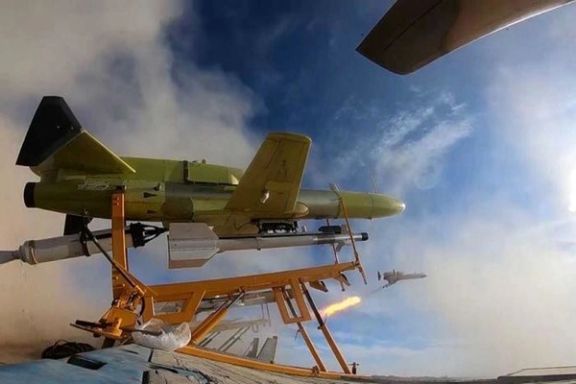
While Friday’s action may do little - any US assets of those designated can be frozen - it illustrates the Ukraine crisis changing calculations in Washington over Iran policy. The administration of President Joe Biden took office in January 2021 ostensibly committed to restoring the 2015 Iran nuclear agreement, but has shifted its focus towards sanctions over Tehran’s links with Russia and its treatment of internal protests.
‘Pure damage’
In Tehran, opponents of the 2015 agreement, the JCPOA (Joint Comprehensive Plan of Action) take heart. Saeed Jalili, top security official under President Mahmoud Ahmadinejad, has argued the JCPOA brought little inward investment and was “pure damage” even before the US withdrew in 2018.
Jalili advocates a ‘resistance economy,’ based on domestic production and lowering import dependence. But while Iranian domestic employment picked up slightly after the US in 2018 left the JCPOA and imposed ‘maximum pressure’ sanctions according to government figures, some economists suggested this was more reaction to circumstance, including the falling rial, than any strategy.
Likewise, with ‘maximum pressure’ stymying the Rouhani government’s efforts of attracting western European investment, including energy majors, Iran turned elsewhere, an approach crystalized in President Ebrahim Raisi championing a ‘turn east.’
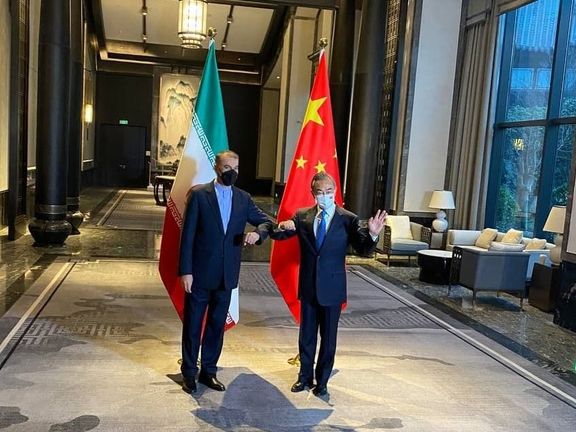
But many analysts argue that the Ukraine crisis – although regime officials forlornly hoped it would make Europe desperate for Iranian energy – has accelerated Iran-Russia rapprochement, which both sides say they would like to base on economics as well as security.
Stoking Iranian skepticism towards Russia
The Washington Institute this week published a policy paper by senior fellow Henry Rome arguing the US should “stoke longstanding Iranian skepticism towards Russia” to combat the “tightening of ties” triggered by the Ukraine crisis. Rome cited November’s statement from 35 former Iranian diplomats calling Tehran’s reaction a “grave mistake” and reiterated allegations that Russia had leaked to the media details about shipments of Iranian drones.
The US, Rome argued, should “emphasize the potential for friction and mistrust between the two partners” to “generate the most intense reaction in Tehran,” as well as extending sanctions over drone shipment, and encouraging European States to designate Iran’s Revolutionary Guards (IRGC) to “impose a greater economic cost on Tehran for supporting Russia.”
European Union foreign ministers are expected to discuss new Iran sanctions at the end of January. In letter published in the newspaper Volkskrant on Friday, leaders of ten Dutch parliamentary parties called for the IRGC to be designated along with officials and their families.
Netanyahu the mediator?
In other fall-out from Ukraine, an aide to President Volodymyr Zelenskyy told Israeli television Thursday that new Prime Minister Benjamin Netanyahu was a potential mediator with Russia. Mykhailo Podolyak said he had “no doubt” Netanyahu “understands precisely what modern wars are and what is the essence of mediation under these conditions.”
While the Ukraine war has boosted Israeli arms sales due to poorly-performing Russian weapons, Netanyahu - who touted his warm relationship with Putin in 2019 elections by slapping a giant picture of the Russian president outside the Likud Party headquarters - has said he was approached while in opposition to mediate but deferred to the government.
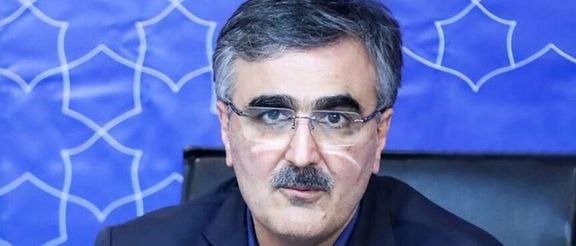
The new chairman of the Central Bank of Iran (CBI), amid a serious economic crisis, said Friday that macroeconomic indicators show signs of improvement.
Mohammad-Reza Farzin, appointed last week, did not explain which economic indicators show improvement. His predecessor was sacked because of a serious financial and currency crisis.
The Iranian rial has lost 50 percent of its value since mid-2021 and 30 percent this year, raising fears of higher inflation. Iran’s annual inflation rate is al,ost 50 percent, with food prices averaging 78 percent increase in the past 12-month period.
The financial crisis comes at a time of antigovernment protests, instilling anger among the population impoverished in the past five years after the United States imposed sanctions on Iran’s economy.
Farzin was speaking at his first meeting of a government outfit called “Headquarters for Economic Information and Propaganda” established in 2018 to fight against “psychological warfare” in markets. Iranian officials often blame poor economic performance on “enemy” conspiracies.
Farzin strongly intervened in the currency market on December 31 as the rial sank to 440,000 to the US dollar last week. The amount of foreign currency injected into the market was kept secret, but the rial regained close to 10 percent of its value but remained at almost an all-time low of 400,000 to the US dollar. Subsequent interventions only had a temporary impact.
The rial has been steadily losing value since the Islamic Republic was established in 1979, when the dollar equaled just 70 rials.
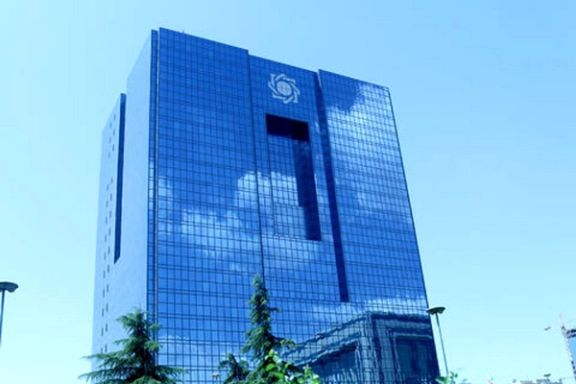
Iran has foiled a cyberattack on its central bank, and government -controlled apps, the country's telecommunications infrastructure company said on Friday.
Anonymous and other global hacking groups threatened in October to launch cyberattacks on Iranian institutions and officials in support of anti-government protests and to bypass internet censorship there.
Several hackings did take place and a throve of government secrets have been put online by hactivist groups since October. The most notable were secret briefing files stolen from Fars news agency that reveled texts of secret briefings for senior officials.
Amir Mohammadzadeh Lajevardi, head of the Infrastructure Communications Company, said the central bank was targeted by a distributed denial-of-service (DDoS) attack on Thursday night, the official IRNA news agency quoted him as saying.
DDoS attacks attempt to cripple servers by overwhelming them with internet traffic.
"These days, the largest volume of foreign attacks is against banks and financial institutions, internet providers and communications infrastructures, which have been repelled," Lajevardi said. IRNA gave no further details.
The central bank said in September that a cyberattack briefly took its website offline.
Internet access has been severely limited in Iran since widespread protests erupted over the death in mid-September of a young Kurdish woman, Mahsa Amini, while in the custody of the morality police over enforcement of mandatory dress code laws.
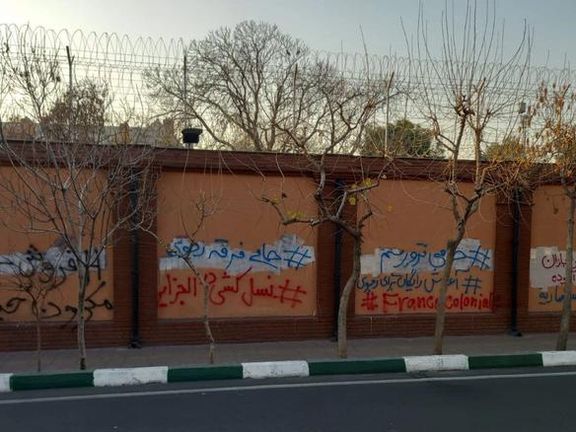
An Iranian lawmaker and IRGC officer in December called for the “serious implementation” of a 2011 law to reduce diplomatic relations with the United Kingdom.
At the time the outer walls of the UK embassy in Tehran were defaced by anti-British slogans. This week, hardliner elements did the same to the French embassy after the satirical Paris magazine Charlie Hebdo published a special issue with caricatures of Supreme Leader Ali Khamenei.
The issue of downgrading Tehran's ties with London had also been discussed at the Iranian parliament in 2009 and 2010. In 2010 ultraconservative lawmakers demanded severing ties with London altogether. The motion was sent to the Foreign Relations and National Security Committee of the Majles, but did not go any further.
Esmail Kowsari, an IRGC general who is a member of the parliament (Majles), demanded the implementation of the law against the UK and also called on the government to reconsider its ties with Germany and France.
In 2011, the move was motivated by a set of UK sanctions against Iran and in late 2022 Iranian hardliners began a series of acts of vandalism against the British embassy in Tehran as the United Kingdom, Germany and France took the lead in escalating international actions against Iran's human rights violation and drone deliveries to Russia, as well as passing a resolution at the United Nations to set up a fact-finding committee about Tehran's violations of human rights.
Kowsari told Etemad Online in December that the three European states have sinister ideas about the Iranian nation and their anti-Iranian moves have proven this. Kowsari also said in an interview with the IRGC-linked Fars News Agency: "We wish to expand our diplomatic relations, but we do not want this relation at any price."
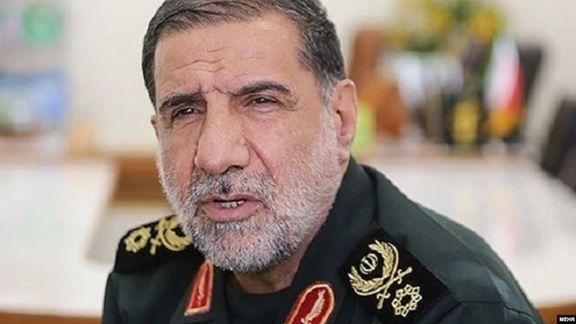
Thursday morning in Tehran, vigilante groups vandalized parts of the French embassy in Tehran in revenge for French satirical publication Charlie Hebdo publishing a special issue on Wednesday with cartoons about Khamenei under the title: "Let's take back the mullahs to where they come from."
The Iranian foreign minister called the cartoons "rude and unethical" and summoned the French ambassador to the Foreign Ministry to hand him a note of protest mindless of the fact that unlike the Islamic Republic, the French government does not intervene in the affairs of independent press. Foreign Minister Hossein Amir-Abdollahian threatened to give a firm and effective response to the satirical weekly. Meanwhile, Iran shut down the French "Iranian Studies Center" in Tehran, a prestigious research center whose works are respected by Iranian and French scholars.
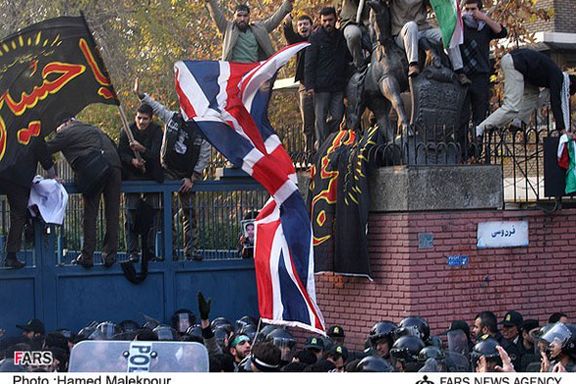
The 2011 legislation was followed by an arson attack on the British embassy in Tehran by vigilante groups who were characterized by the government-owned press as "students," but independent sources questioned the characterization. Iran's -then- deputy foreign ministers Hassan Ghashghavi and Ali Ahani went to the Majles to convince the lawmakers that cutting ties with London was not in the country's interest. The Majles subsequently added a clause to the legislation which said that ties with the UK could be normalized if the UK changed its policies toward Iran.
In 2017 Ahmadinejad called the legislation and the attack on the British embassy a move that provided pretexts to the United Kingdom to take action against Iran. He also accused the Iranian state television of broadcasting live the attack on the British embassy.
Hardliner members of the parliament prevented -then- UK Foreign Secretary Jack Straw from taking part in Hassan Rouhani's inauguration ceremony in 2013. But eventually, three years later the two countries’ embassies were reopened after a relatively long closure.